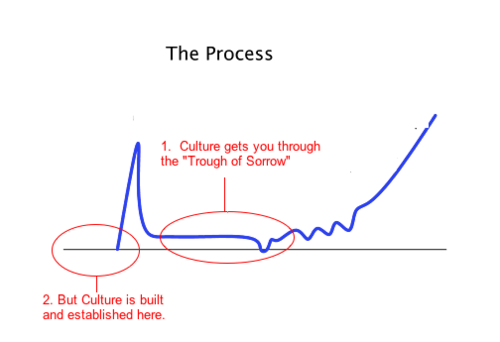A special thanks to Russ Glass (@glassruss) and Sean Lindsay (@rseanlindsay) for helping inspire and review this post.
—
Spring 2009 is a time period that I hope to never experience again, yet it yielded some of the biggest lessons I’ve learned in my professional career. Those were the early days in the launch of the iOS platform and social gaming on Facebook. Viximo, the virtual goods and social gaming company I had co-founded, was right in the middle of this craze.
In a time with so many exciting opportunities we had scaled the team from 10 to over 30 in the course of 6 months. We had “promises” from Apple on being featured in the App store, enthusiastic conversations with our investors about raising a $10M round of funding, and plenty of Techcrunch coverage. Everything was going well. Or at least we thought it was.
When the numbers started coming back the picture was more grim Engagement was low, user growth was minimal, and there was no revenue. We were out of money, none of our products were working, and as a result Viximo incurred the dreaded down round of financing. The grueling year of work we had put into the company started to seem like it was a waste.
In the course of a couple of weeks my co-founder, Sean Lindsay, and I had to let go over half of the team; the team that we had personally recruited and convinced to trust us. Included was one of my best friends while he was on vacation…Ouch. (We’re still friends, but he doesn’t let me forget!)
We were officially, deep, in the Trough of Sorrow.
The Trough Of Sorrow
Paul Graham previously wrote one of his timeless pieces depicting the startup curve (see below). One of the most important pieces discussed is the “Trough of Sorrow,” the long and seemingly never-ending time period after the excitement of the initial launch wears off and reality sets in. Many startups don’t make it through this time period. I certainly had my moments at Viximo where I didn’t think we were going to make it but we did, and here is why.
Culture
The “Trough of Sorrow” for Viximo lasted about one full year and there were two amazing things that came out of that time period. First, not a single member of our amazing core team that remained after the lay offs left the company. Second, the general sentiment and outlook among the team somehow remained positive and confident. These two things allowed me and the executive team to re-focus the company on building a social game distribution platform that ultimately got traction and started generating meaningful revenue.
There is only one thing that got us through the “Trough of Sorrow”: Company Culture. A year and half after those layoffs I asked almost every one of those core team members why they had stayed. Every single one of them, in some way, shape or form, answered because of the company culture. They simply didn’t want to work anywhere else.
The Most Important Point
While Culture helps get you through the “Trough of Sorrow”, it is built at the beginning of the startup curve (see below). The “Trough of Sorrow” is a true test of the culture you have built and once it hits, it is too late to start making culture a priority. You need to focus on Culture when it doesn’t seem immediately important. It is this quality that partially makes building a great culture so difficult.
Sean and I had made culture the priority before we had even decided to work together. We discussed in detail the type of company we wanted to create, not from a product and market stand point, but from an environment, people, and values view. The most important thing we did was stick to our guns throughout the history of the company.
Never Compromise
Your company’s culture is the blueprint to everything that is important about the startup process — hiring, work ethic, iteration process, how you deal with challenges, how you celebrate success, everything. There will be numerous temptations to compromise culture whether it is pressure from your investors, to desperately needing another engineering hire to hit a deadline.
If I had one recommendation to founders it is this - never compromise, sacrifice, or dilute your culture. Culture is the lifeblood of your company and as a founder it is your job to define it, build it, and most importantly, defend it.
—
I’ll be responding to questions in the comments below. Get my posts via email or follow me on twitter (@bbalfour).




Comments